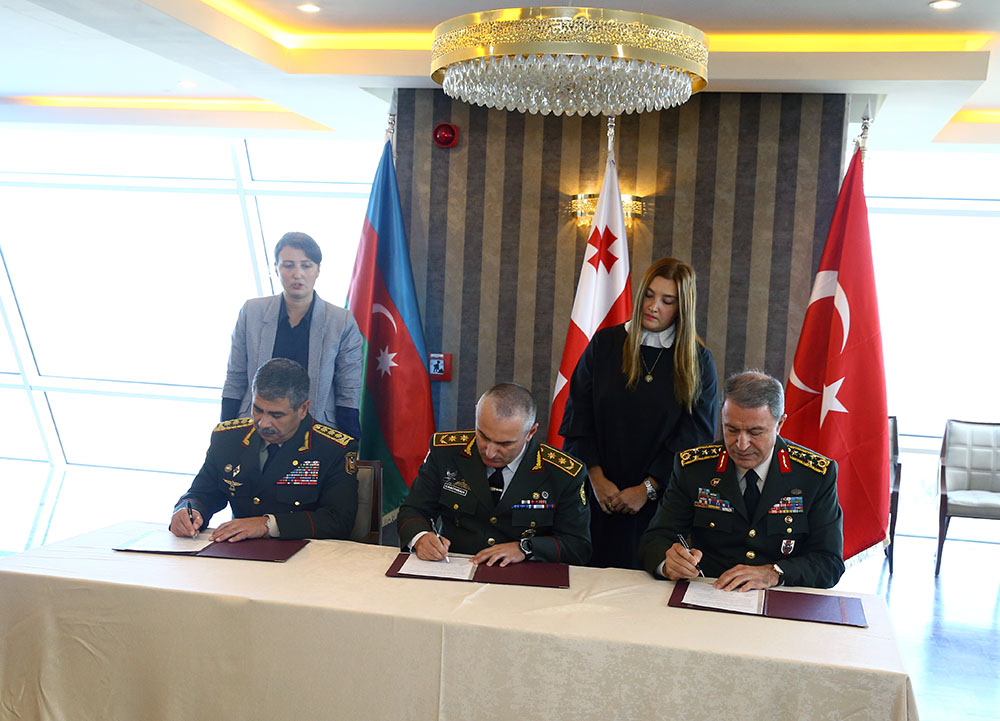The military-political situation in the South Caucasus and the current state of regional security was the focal point of discussions during the sixth meeting of high-ranking military officials from Azerbaijan, Georgia, and Turkey in Georgia’s capital Tbilisi on Tuesday.
Azerbaijan’s Defense Minister Zakir Hasanov, the Chief of Staff of the Georgian Armed Forces Vladimer Chachibaia, and the Chief of Staff of Turkish Armed Forces Hulusi Akar all participated.
“This [trilateral] cooperation, which also includes defense cooperation, actually provides a greater international function to Georgia and Azerbaijan,” Giorgi Badridze, Senior Fellow at the Georgian Foundation for Strategic and International Studies in Tbilisi, told Caspian News.
The South Caucasus region is no stranger to conflict. Since the collapse of the Soviet Union in 1991, several conflicts have erupted, involving all three countries in the region, namely Armenia, Azerbaijan, and Georgia.
Since the creation of both states following the dissolution of the USSR, Armenia and Azerbaijan have been locked in an armed conflict over Azerbaijan's Nagorno Karabakh region, an integral part of the country's internationally recognized territory. The region, along with seven surrounding districts, has been occupied by Armenian military forces since the early 1990s. Despite a ceasefire signed in 1994, periodical standoffs took place with the latest clash in April 2016, resulting in Azerbaijan returning about 2,000 hectares (4,942 acres) of its occupied land.
Georgia has seen flare-ups in its Abkhazia and South Ossetia regions, both which share borders with Russia. That country faced a two-year war, lasting from 1992-1994, and again in 2008.
Turkey, being no stranger to separatist claims from groups within its national borders, such as the Kurds, has supported the territorial integrity of both Azerbaijan and Georgia, unambiguously condemning separatist movements in the South Caucasus. As a close ally – ethnically, linguistically, and politically – with Azerbaijan, Ankara halted all relations with Yerevan, following the occupation of Azerbaijani territories in the early 1990s. In 1993, Turkey closed its eastern border with Armenia, due to Armenia’s aggressive occupation of Azerbaijani lands. Ankara has pegged a complete withdrawal of Armenian military forces from Azerbaijan as a precondition for resuming relations with Yerevan.
In Abkhazia conflict, Turkey remains committed to high-level diplomatic ties with Georgia, while backs internationally recognized territory of Georgia and turns its back to regular calls from the Abkhaz rulers for the recognition their independence by Ankara.
“Turkey could contribute to the peaceful resolution of the conflict, particularly in Abkhazia, through its very strong influence in the region and existence of a very influential Abkhaz diaspora in Turkey itself,” Badrizde told Caspian News.







 Russian Foreign Minister Sergei Lavrov has reasserted that Moscow has no intentions to stop the fighting in Ukraine, even if peace talks commence.
Russian Foreign Minister Sergei Lavrov has reasserted that Moscow has no intentions to stop the fighting in Ukraine, even if peace talks commence.
 Iran has refuted reports of alleged damage to Shimon Peres Negev Nuclear Research Centre located southeast of Dimona, Israel, during the recent air...
Iran has refuted reports of alleged damage to Shimon Peres Negev Nuclear Research Centre located southeast of Dimona, Israel, during the recent air...
 Iran’s Foreign Minister, Hossein Amir-Abdollahian, has labeled a foiled Israeli drone attack in certain parts of the country as a "failure" for Isr...
Iran’s Foreign Minister, Hossein Amir-Abdollahian, has labeled a foiled Israeli drone attack in certain parts of the country as a "failure" for Isr...



